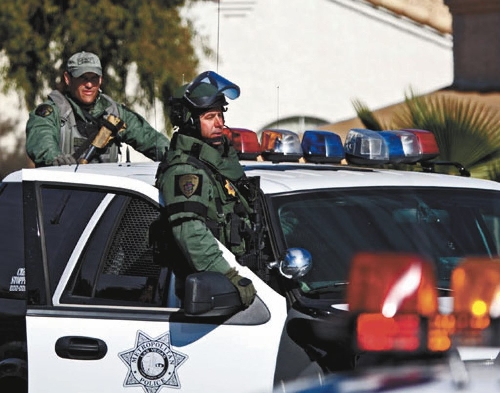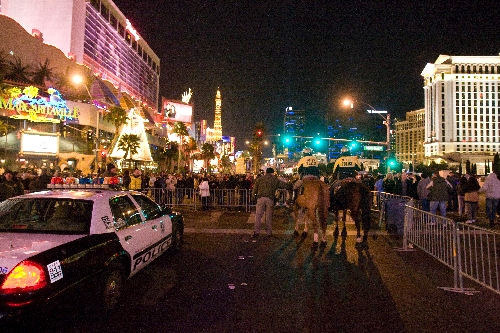Police seek sales tax boost to hire more cops



Clark County consumers could pay more for everything from accordions to zippers if police can persuade the state Legislature to approve their plan to tap a new sales tax aimed at putting more police on the street.
Police, led by the Metropolitan Police Department, want city councils and the County Commission to authorize resolutions asking lawmakers to enact a voter-approved one-fourth cent sales tax and “remove restricting language” from a 2005 law that is meant to force police departments to use money from a voter-approved sales tax increase to put more cops on the streets.
The move would free up about $75 million annually countywide that would offset decreases to other revenue sources that have hit police departments, such as property tax.
“At this point we really have no other choice moving forward, other than to ask the Legislature to help us out,” Las Vegas police lobbyist Chuck Callaway said. “If it doesn’t occur, we are going to be in a really bad position.”
Callaway said the Las Vegas Police Department could use the money to fill more than 300 positions that have been left vacant since the beginning of the recession.
“Our goal would be to fill those vacancies,” he said.
Changing the language in the law would also help the agency access money from a pool that already is available that could fund approximately 30 officers.
“Our focus is to try to get more folks on the street for public safety,” Callaway said.
Others aren’t convinced it’s a smart move.
“I won’t be supporting the sales tax change,” Clark County Commissioner Chris Giunchigliani said. “Sales tax is regressive; we are already at 8.1 percent.”
Giunchigliani said plenty of evidence suggests police should do more with the money they have, citing a recent decision by Las Vegas police to scrap a $42 million radio system over complaints it wasn’t working properly.
“They need to be cutting and stop being wasteful,” she said. “The radios are a good example.”
LOOKING FOR REVENUE
Since the beginning of the recession, the Police Department’s revenue has dropped about 33 percent, or nearly $61 million annually.
In recent years, Sheriff Doug Gillespie has used reserve funds to cover the shortfall. He has also cut about 500 police and civilian positions and wrung some concessions from unions representing department employees.
But with reserves depleted and Clark County and Las Vegas, the Police Department’s biggest funding sources, facing money problems, Gillespie can’t be sure they can deliver the approximately $46 million he needs to cover his projected shortfall.
That is why he wants local governments to support changes to the More Cops tax law.
“It would be an alternate source of revenue to help us replace that lost property tax revenue,” Callaway said.
In 2004, voters in Clark County approved a one-half cent sales tax to pay for more police officers. Las Vegas and other police departments in the county are eligible for the money.
During the 2005 legislative session, however, the Legislature limited the increase to one-fourth cent on the condition police could come back for the remainder later.
The Legislature also added language to allow police to access the money only on the condition local governments were increasing or maintaining law enforcement budgets.
The intention was to prevent local governments from cutting general fund support for police on the understanding they could make up for it by tapping the new tax revenue.
Despite the precautions, police funding remained controversial in the wake of the voter-approved tax increase.
Around the time the increase was being implemented, the Metropolitan Police Department and the Police Protective Association ran into an impasse in labor contract negotiations.
The Metropolitan Police Committee on Fiscal Affairs, which includes representatives from Las Vegas and Clark County, approved a labor agreement with a 25.6 percent increase in pay and benefits over a four-year period.
That offer was rescinded, though, after the County Commission removed Commissioner Tom Collins, a contract supporter, from the committee and replaced him with then-Commissioner Rory Reid, who voted against the contract, essentially killing the deal.
The dispute went to arbitration and was settled in favor of management’s offer, which was a 21.85 percent increase.
Although the voter-approved tax was a separate issue from the contract impasse, the dispute created an image problem for Las Vegas police and local governments, former County Manager Thom Reilly said.
“Although the money clearly was just for hiring new, the perception was horrible,” Reilly said.
SHOULD VOTERS BE ASKED?
Local governments looking to reduce their own projected budget deficits for the most part appear eager to make available a new source of cash for cops.
But the proposal is prompting questions, such as why the voters aren’t being asked to weigh in on the issue, given the 2005 law regulating the police tax says the County Commission “shall not submit such a request to the Legislature if a majority of the voters in the County disapprove the proposed change.”
“You had time to submit this consideration on the ballot,” said Las Vegas City Councilman Bob Beers, noting the city prepared its budget months ago and the Police Department’s revenue decreases were widely known. “Instead, it is being forced in the window between the election and the legislative session.”
Another issue Beers raised in response to the proposed resolution is the system for paying public employees in Nevada.
Beers said state law covering negotiations between public employers and public employee unions has led to Nevada having fewer public workers per resident than most places, with those workers earning disproportionately higher wages.
The strategy of paying fewer workers more money can work to a point but has limits, Beers said.
“It is just physically impossible for that number of employees to get the job done,” he said.
But Stavros Anthony, Las Vegas city councilman and former Las Vegas police captain, said the resolution is appropriate given the fact the recession has wiped out other funding sources and made it nearly impossible for police and local governments to clear the revenue hurdles that prevent them from accessing the More Cops money.
“The one-fourth-cent increase the sheriff is asking for will put more police officers out on the street fighting crime,” Anthony said. “I believe that is following the intent of what the voters authorized.”
Contact reporter Benjamin Spillman at bspillman@reviewjournal.com or 702-383-0285 .












